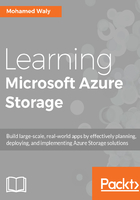
上QQ阅读APP看书,第一时间看更新
Azure portal (ARM model)
In 2014, Microsoft launched a new portal which follows a new model, called the ARM model. This portal can be accessed via the following URL https://portal.azure.com/.
This model depends on the concept of resource groups, which means you can group all your resources within a container, resulting in resources being deployed in parallel. As a result, you will not face the same problems as you did with the classic portal.
The following diagram describes the deployed resources through the ARM model:

Figure 1.3: Resource Manager management model at a high level
Here are the benefits you will gain using this portal:
- Ability to manage your resources as a group instead of managing them separately.
- Use Role Based Access Control (RBAC) to control access to resources, so that you can assign permissions to a user on a resource or some resources but not to other resources (as it was in the classic portal).
- Use tags to organize and classify your resources, which can help you with billing. For example, you might want to monitor the billing of some resources that make up a solution, for example, a web server. By assigning a tag to the resources that make up that solution, you would be able to monitor its billing, and so on.
- Support the usability of JSON to deploy resources instead of using the portal.
- Deploy resources in parallel instead of deploying them sequentially and waiting until every resource deployment finishes to deploy another one.
- Specify dependencies during the deployment of resources. For example, a VM will not be created until a storage account and a virtual network are deployed because the VM VHD would need a place to be stored in and an IP Address from a virtual network./li>
- Reuse the JSON template to deploy a solution with the same specifications.
- Resources with the same life cycle should be gathered in the same resource group.
- Resources in different regions can be in the same resource group.
- The resource cannot exist in multiple resource groups.
- A resource group supports RBAC, wherein a user can have access to some specific resources, but no access to others.
- Some resources can be shared across resource groups, such as storage accounts.
- ARM VMs can only be placed in ARM storage accounts.
When you open the Azure portal, it will look like the following screenshot:

Figure 1.4: Azure portal
- You can change the background of the portal by double-clicking on any unused area of the dashboard. You can navigate between four colors (blue, dark blue, white, and black).
- For further information about the difference between the ARM and ASM models, check out the following article: https://blogs.technet.microsoft.com/meamcs/2016/12/22/difference-between-azure-service-manager-and-azure-resource-manager/.